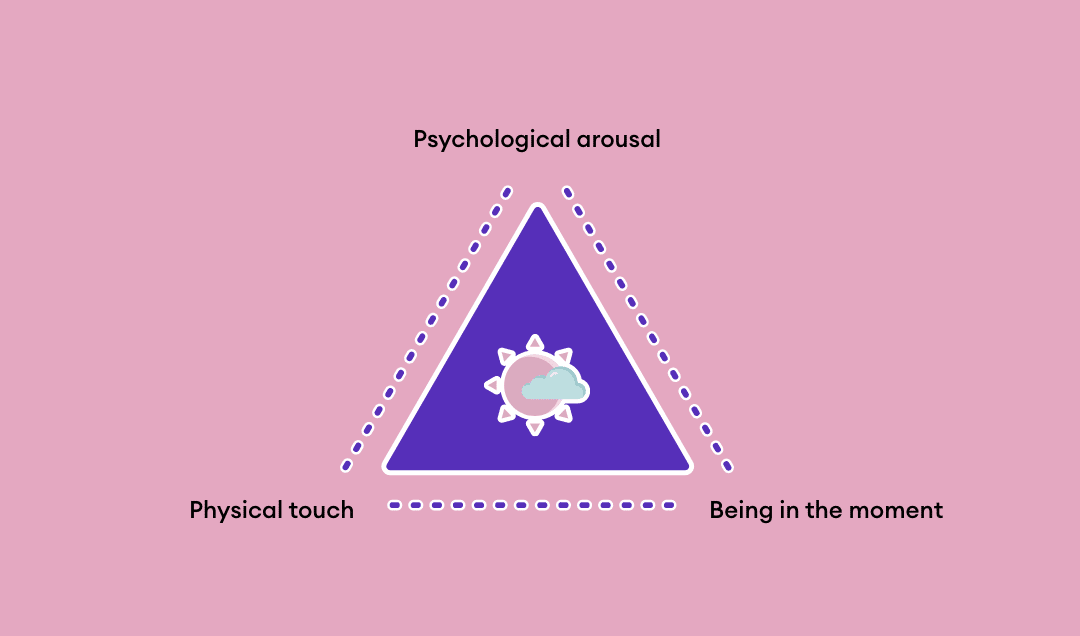Part of knowing yourself sexually and getting the most out of your sexual experiences is understanding your ‘conditions for good sex’. (Gurney, 2020).
Knowing what we want and need from sex can be difficult, especially when in the past we might have engaged in sexual experiences that were not good for us or left us feeling out of control in some way. Exploring ideas around what we think we might need now in our sexual life can be important to help create a sense of what good sex means and what we want to seek out in sexual experiences going forward.
You can think of these conditions as an interrelated triangle, of which all three points are crucial to your sexual experience.

Psychological arousal – this refers to how much of what is happening involves experiences or contexts that you find erotic, and how much the connection you have with that person meets these needs also. It involves things like the environment, trust, safety, love, power play, how exciting you find different sexual acts, visual stimuli, the dynamic or connection between you and your partner, talking, attraction, passion, props, sensuality, closeness, eye contact, the role you take and much more. This part of the triangle can be thought of as how close this sexual situation matches up to the kind of sexual situation you would create in a fantasy, for example, or which would create maximum arousal.
Physical touch – this refers to how close the physical stimulation is to the type of physical stimulation that makes your body feel good. This can be anything from the type of kiss that you like to whether you like penetration or not (and if so, where), the pressure of touch you like to your skin, and the speed and location of touch to your genitals. It could be around restraint, fabrics, the feel of body hair, the feel of someone’s body. There is some overlap here with the psychological, as a sexual position you enjoy could be both about physical touch (you feel the most pleasure in that position due to the contact between your bodies) but also psychologically arousing (as you find that position hot).
How present you are – this refers to how ‘in the moment’ you are, versus being away with your own thoughts or distractions. This can be anything from feeling worried, self-conscious and anxious, to being distracted by something innocuous in the background. There is a continuum here, with being totally in the moment or totally present at one end and being totally distracted by what’s going on in your mind at the other. The reality is that we might be somewhere between those two points, but the closer we are to being present, the better.
The content of each of these three aspects will be different for all of us, and it’s this reason that it’s impossible to be ‘good at’ sex, as you can never really know what someone else’s conditions will be without asking or being told.
In this case, you might be good at talking about sex, or responding to feedback – both of which are great skills for sex – but the phrase ‘good at sex’ is a societal term which implies that there is a ‘right’ way to do sex that works for most people, and this is simply not the case.
If we feel really turned on (high psychological arousal), are receiving pleasurable physical touch and have a low level of distraction or worry (in the moment not in our heads), we are meeting our conditions for good sex and it’s more likely that this sex will be pleasurable for us resulting in increased sensation, arousal, orgasm and desire.
Without knowing what these primary conditions for each of us are in the first place, we are starting from a huge disadvantage when it comes to negotiating good sex with others. An important aspect of understanding your own sexuality is recognizing that ‘sex’ is not just one thing, and the types of sex, the way you have sex, the pleasure you get from it and how it makes you feel about yourself and your relationship are all crucial factors in sexual satisfaction and desire. ‘Sex’ can mean any number of experiences day to day, year to year, or relationship to relationship, and it’s important to understand what types of ‘sex’ are good for you and in what contexts. You can see this reflection as looking inwards at your own sexuality before we can consider how your sexuality fits with anyone else’s, as it’s essential to have a clear understanding of how your own sexuality operates before you can expect it to dovetail optimally with a partner’s.
Trying this for yourself:
Finding your conditions:
- Draw a triangle on a large piece of paper, with 3 points: arousal, touch, and in the moment.
- Think of the 3 best sexual experiences you have had with another person. Try to recall everything about these experiences that made them great and add them to the triangle.
- Then, add things you would like to try, as well as what works for you during masturbation.
Here are some prompts which might help you when thinking about this – but don’t feel constrained by this list!
- Sexual talk
- Feeling in sync with the other person -Being able to ask for what you want -Tension/build-up/erotic charge/suspense
- Making/hearing noise
- Visual cues like watching hips thrusting, seeing biceps rhythmically moving, seeing wetness, seeing body parts that are attractive
- Eye contact
- Environmental factors: lighting, music, surroundings, textures -Body confidence
- Intimacy
- Having sex with more than one person
- Playing with power
- Playing with restraint or pain
- Biting
- Pushing boundaries
- Types of touch: gentle, firm, grabbing, slapping, stroking,
- Types of kissing and places you like to be kissed
- Taking control /relinquishing control
- Positions (not just sexual positions – positions you like to be in for kissing, for example)
- Sex acts (giving or receiving oral sex, fingers inside vagina/anus, rimming, penetrative vaginal/anal sex, rubbing bodies up close together, etc)
- How you like to feel about yourself/see yourself during sex
- How you like to experience the other person and how they act during sex
- Attraction to the person
- Animalistic/passionate sex
- Feeling free/alive/spiritual
Sharing this with your partner(s):
If you are in a relationship, a great next step is to share it with a partner. Ideally, they could complete their own too. It’s normal to have differences, and not a sign of sexual incompatibility.
- Listen without responding initially. Try to hear what your partner is communicating and let them speak in terms that feel comfortable for them. Once they have finished, then you can ask questions if you need to, with a focus on being curious about the other person’s perspectives and what they might mean by things they feel might work for them.
- Try not to get defensive, and be gentle and careful with the words you use in discussion
Once you have compared conditions, try to discuss the following:
- Is there anything on your partner’s conditions you didn’t know before?
- Ask them more about it. Is this something you might agree to try out or build on?
- For the things you did know, how often do these feature in your sex life?
- If they’re infrequent, what gets in the way?
- There will be some total ‘no-nos’, which neither of you wants to do, and that’s fine.
- Are there any you would consider with modification, or doing occasionally?
Do this task again from time to time, as your conditions might change over time. Knowing yours and your partner(s) conditions is a key foundation for good sex.



